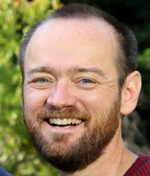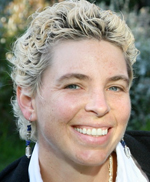A multidisciplinary team at UC Santa Cruz has been awarded a $2.1 million grant to foster collaborations between UCSC graduate students and Watsonville-area high school teachers to develop innovative approaches to teaching math and science through hands-on research and projects in environmental sciences.
The five-year project, funded by the National Science Foundation, involves UC Santa Cruz professors and grad students in the departments of Environmental Studies, Ecology and Evolutionary Biology, and Education. Known as Santa Cruz-Watsonville Inquiry-Based Learning in Environmental Sciences, or SCWIBLES, the program is a collaboration of UCSC environmental scientists and teachers at Watsonville High School's Environmental Science and Natural Resources (ESNR) Academy.
Environmental science graduate students will work with teachers and high school students in the Pajaro Valley Unified School District (PVUSD) to develop curriculum based on doing science, not reading about it. "It's a tremendous opportunity for hands-on learning," said Watsonville High School Principal Murry Schekman. "It will make science real for our students."
Gregory Gilbert, SCWIBLES director and UCSC professor of environmental studies, said the program has several objectives. One is to train science graduate students in how to translate and share scientific concepts and processes with a diverse and non-scientific audience, principally high school students and teachers.
Another is to provide teachers with research experience and the practical tools that help bring science alive to their students. "They are educating the next generation of potential scientists, professionals, and leaders in the growing local green economy - including natural resource management, agriculture and food industries, and environmental economy," Gilbert said.
UC Santa Cruz Chancellor George Blumenthal hailed the environmental sciences learning project. "This is great news for education in the Monterey Bay Area. SCWIBLES is an outstanding model of the kind of collaboration that will benefit all levels of education and learning," said Blumenthal, who co-chairs the Monterey Bay Educational Consortium that links educators from K-12, community colleges, CSU Monterey Bay, and UC Santa Cruz.
"It gives high school and middle school students real-world examples of career and educational opportunities in science and math," he said.
In its first year, the project will involve ESNR Academy students in grades 10-12 at Watsonville High School. In subsequent years, the project will expand to other Pajaro Valley schools and grades.
A key component is a summer research fellowship program in which UCSC graduate students will partner with high school teachers to jointly conduct environmental science research and to develop inquiry-based curricula for high school students based on their research experiences.
SCWIBLES also includes a community outreach component with parents and community members in Watsonville.
The project grew out of work that Gilbert and his UCSC colleagues Ingrid Parker, professor of Ecology and Evolutionary Biology, and Doris Ash, associate professor of education, have pursued in recent years in both graduate training and efforts to increase diversity in graduate students and faculty.
It received a big boost at a fortuitous dinner last spring at Cabrillo College that brought together educators from K-12 schools through the university.
Gilbert said he met with Watsonville High Principal Schekman and sat with teachers from the ESNR Academy. "We had a really great conversation about the possibility of a proposal that would tie some of our earlier work with what the high school teachers were doing," Gilbert said.
That was followed by a subsequent meeting in which key professors, teachers, and graduate students developed a program outline. The 56-page proposal that evolved from that meeting received final approval from the National Science Foundation last week.
"This is an exciting project for us and for Watsonville High School, at a time when local education really needs a boost," Gilbert said.





